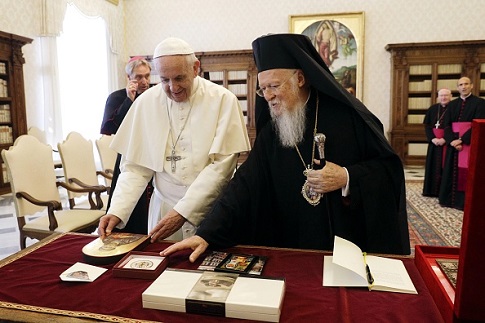Russian hackers indicted last month as part of Special Counsel Robert Mueller’s investigation into interference in the 2016 election have also targeted Orthodox clergy. The hackers tried to steal private correspondence of high-ranking Orthodox clergy, the Associated Press found.
Aides of Ecumenical Patriarch Bartholomew I were among those targeted by the hackers. The patriarch, who is based in Istanbul, is considering whether to permit Ukraine’s church to break away from Russia.
A decision in favor of a split would pose a severe challenge to the Russian Orthodox Patriarchate of Moscow, which has sought to frame itself as a leader in the global Orthodox Church. The controversy comes as Ukrainian armed forces and Russia-backed separatists battle in eastern Ukraine.
Vasilios Makrides, a specialist in Orthodox Christianity at the University of Erfurt in Germany, said such a decision "would be a huge blow to the claims of Moscow’s transnational role. It’s something I don’t think they will accept."
In April, Ukrainian president Petro Poroshenko flew to Istanbul to argue in favor of a split, and later this week, Moscow’s Patriarch Kirill will attempt to convince Patriarch Bartholomew otherwise.
Hilarion Alfeyev, a representative of Patriarch Kirill, has warned that allowing a split would leave Orthodox unity "buried."
The Russian hackers also targeted Muslim, Jewish, and Catholic leaders, including some in the United States. They went after the papal nuncio in Kiev, an umbrella group representing Ukrainian Muslims, and the chancellor of the Orthodox Church in America.
Approximately 70 percent of Ukraine’s population of 45 million identifies as Orthodox. A newly independent Ukrainian Orthodox Church would become one of Eastern Orthodoxy’s largest churches. The Russian Orthodox Church’s presence in Ukraine would likely be reduced by around 50 percent, and Patriarch Bartholomew would gain the support of the new church, thereby limiting the Moscow Patriarchate’s influence.
Daniel Payne, a researcher on the board of the J.M. Dawson Institute of Church-State Studies at Baylor University in Texas, argued Patriarch Bartholomew’s decision has potentially severe implications for Russia. "Kiev is Jerusalem for the Russian Orthodox people," Payne said. "That’s where the sacred relics, monasteries, churches are…it’s sacred to the people, and to Russian identity."
One analyst noted the decision’s political implications in a comment to the AP. "Our church leaders are connected to the FSB [Federal Security Service of the Russian Federation] and their epaulettes stick out from under their habits," said Dmitry Oreshkin. "They provide Vladimir Putin’s policy with an ideological foundation."
